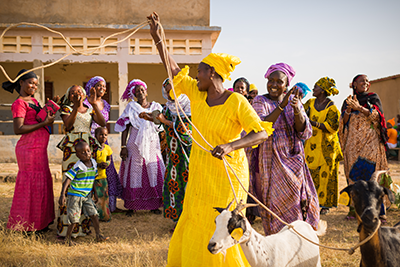
As we wrap up Women’s History Month, our team at NCBA CLUSA has been reflecting on how women’s empowerment is an essential part of our vision and approach to programming both for our international programs and our U.S. initiatives.
From building resilience to creating economic opportunities, providing women opportunities for leadership, ownership and education are core to how our work is focused and how co-ops, with the right support, are well positioned to empower entire communities.
Evidence suggests that gender inequalities, the difference in access and opportunities between women and men, significantly impact economic growth. Starting from a young age, educating girls contributes not only to their well-being, but to their participation in the labor force and their ability to generate income for themselves and their families in the future. Later in life, women’s economic empowerment helps reduce income inequality, supports economic productivity, and allows local economies to grow.
Understanding this, international development organizations and our donors, private sector partners and members should focus their work on women’s empowerment to address poverty alleviation and build a more inclusive economy. To encourage women’s participation, leadership and decision-making, development programs need to address women’s agency, their access to information, and the availability of resources. In our three practice areas at NCBA CLUSA, here’s how we address women’s empowerment:
Building Resilient Communities
In our approach to the practice area, Building Resilient Communities, NCBA CLUSA addresses systems and institutions and seeks to build the capacity of households and communities to respond and adapt to shocks such as natural disaster, income loss, illness and other expected stresses. We ensure that women are not only part of the conversation, but that they are empowered to make decisions to participate meaningfully in preparation, response and adaptation to unexpected challenges within their household or in their community. We are supporting nutrition-sensitive and climate-smart agriculture through activities like women’s land tenure, husbands’ schools, and Debbo Galle groups (mothers and caretakers’ groups), ensuring nutritious options for children and families using sustainable and community-driven approaches. We know that when women are more able to spend time and energy efficiently, they are better positioned to support themselves and their family’s well-being.
Creating Economic Opportunities
In this practice area we address gaps and barriers for women and men in specific value chains, including gendered division of labor, equity in pay, access to financial services, access to technology or inputs, and market linkages. Beyond value chains, other avenues for income generation are explored, including entrepreneurship and other women-led economic initiatives. Some of the approaches taken involve identifying and promoting alternative sources of income, helping create or support community-based savings and loans, or addressing obstacles for growth through capacity building, engaging industry leaders, and advocating for more equitable policies.
Strengthening Cooperatives and Producer Groups
As the country’s oldest cooperative development and trade association, NCBA CLUSA is a leader in supporting cooperatives and producers’ organizations around the world. In this capacity our work also encompasses supporting women’s participation and leadership within this business model. We support women’s empowerment and entry into their local economy through cooperative development—promoting, strengthening and helping grow cooperative businesses. One of our approaches involves capacity building for women’s participation on cooperative boards, so that they can be active and effective leaders. Another approach is addressing women’s barriers to economic opportunities through member equity, such as childcare and/or health services through cooperatives.
Based in the cooperative principles of equity, inclusion and democracy, our community-led approach supports groups to develop foundational structures that encourage participation, leadership and ownership for women. Together, we can build more resilient communities, create economic opportunities and strengthen cooperatives for a more inclusive economy.


